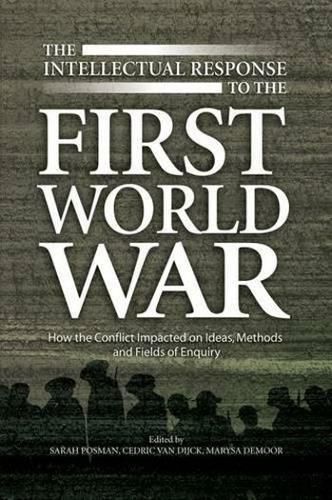Readings Newsletter
Become a Readings Member to make your shopping experience even easier.
Sign in or sign up for free!
You’re not far away from qualifying for FREE standard shipping within Australia
You’ve qualified for FREE standard shipping within Australia
The cart is loading…






The First World War changed the dynamics of the European intellectual landscape in terms of international collaboration, the development of disciplines and new institutional visions. The conflict not only destroyed much of Europes material cultural heritage, it also damaged the 19th-century humanist conception of the function of thought and problematised the position of the thinker in society. What is the intellectuals task in a time of destruction and death? This book spotlights the ways in which the war redrew the map of knowledge production and changed traditional paradigms, fundamentally altering the approach to intellectual work. Thinking became more democratic and specialised, with a range of voices tackling specific problems created by the war, but now more conspicuously related to particular causes. The focus on the viewpoints of the 19141918 intellectual cadre throws into perspective the ways in which the war changed the contents, methods and organisation of intellectual work. Part One looks at the war as an object of study; Part Two explores the methodological challenges the war entailed; and Part Three sheds light on the ways in which the conflict and its aftermath redrew the map of collaborative intellectual networks. The case-studies come from different disciplines and cover a range of contexts, from German engineering to British wartime periodicals. Revisiting the early 20th-century intellectual situation not only enriches our understanding of the dynamics of the Great War, it also assists in repositioning the role of the intellectual in the 21st century.
$9.00 standard shipping within Australia
FREE standard shipping within Australia for orders over $100.00
Express & International shipping calculated at checkout
Stock availability can be subject to change without notice. We recommend calling the shop or contacting our online team to check availability of low stock items. Please see our Shopping Online page for more details.
The First World War changed the dynamics of the European intellectual landscape in terms of international collaboration, the development of disciplines and new institutional visions. The conflict not only destroyed much of Europes material cultural heritage, it also damaged the 19th-century humanist conception of the function of thought and problematised the position of the thinker in society. What is the intellectuals task in a time of destruction and death? This book spotlights the ways in which the war redrew the map of knowledge production and changed traditional paradigms, fundamentally altering the approach to intellectual work. Thinking became more democratic and specialised, with a range of voices tackling specific problems created by the war, but now more conspicuously related to particular causes. The focus on the viewpoints of the 19141918 intellectual cadre throws into perspective the ways in which the war changed the contents, methods and organisation of intellectual work. Part One looks at the war as an object of study; Part Two explores the methodological challenges the war entailed; and Part Three sheds light on the ways in which the conflict and its aftermath redrew the map of collaborative intellectual networks. The case-studies come from different disciplines and cover a range of contexts, from German engineering to British wartime periodicals. Revisiting the early 20th-century intellectual situation not only enriches our understanding of the dynamics of the Great War, it also assists in repositioning the role of the intellectual in the 21st century.